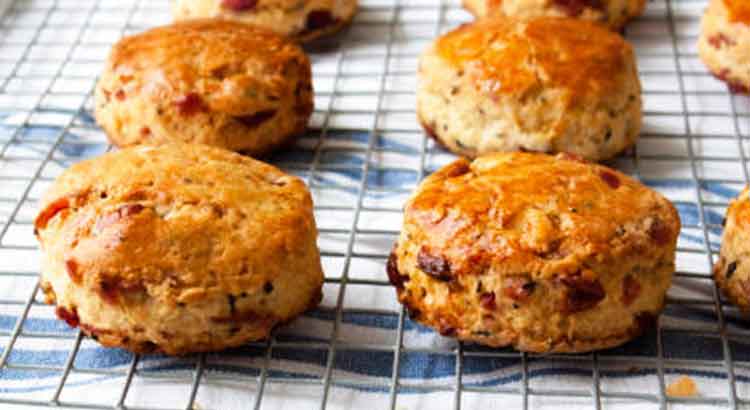Are your scones turning out harder than you’d like?
The most common reason scones turn out hard is overworking the dough. When you knead the dough excessively, it activates the gluten, making your scones tough.
But fear not, we’ve got your back! In this article, we’ll delve into the 7 common reasons why your scones may be lacking that delightful softness, and we’ll provide you with easy fixes for each issue. By the end, you’ll be baking scones that are not just delicious but also wonderfully tender. So, let’s roll up our sleeves and get ready to create scones that melt in your mouth!
Overmixing the Dough
We’ve all been there, right? You’re excited to bake some scones, and you dive headfirst into the dough, mixing it like there’s no tomorrow. But guess what? Overmixing is one of the top reasons why your scones end up harder than you’d like.
When you knead that dough too much, you activate the gluten present in the flour. This isn’t necessarily a bad thing, but for scones, it’s a game-changer. Too much gluten development means your scones will turn out tough and chewy, which is not the texture we’re aiming for.
Solution: Be gentle with your dough. Mix it until the ingredients just come together, and then stop. It’s okay if there are a few lumps here and there – they’ll disappear in the baking process. Your scones will thank you for the lighter touch with a fluffier, more delicate texture.
Using Too Much Flour
Another common misstep in the scone-baking world is using an excessive amount of flour. While it’s essential to have enough flour to form the dough, going overboard can lead to hard, dry scones that even your coffee can’t soften.
When you add too much flour, you throw off the balance of the recipe, making the dough too dense. This density translates to scones that lack the tenderness and flakiness we adore.
Solution: Pay attention to your measurements and use a light hand when scooping your flour. Consider using a kitchen scale for accuracy. Your scones will turn out much softer and more delightful when you get the flour-to-liquid ratio just right.
Overbaking
Let’s talk about another scone culprit – overbaking. Sometimes, in our quest for golden-brown perfection, we leave our scones in the oven for a tad too long. The result? Scones that are as hard as rocks.
Overbaking dries out the scones, sucking away all that moisture we worked so hard to trap inside. It’s like leaving a sponge in the sun; it shrivels up.
Solution: Keep a close eye on your scones as they bake. When they turn a lovely golden hue, pull them out. Trust us; they’ll continue to cook a bit after you remove them from the oven due to residual heat. This way, you’ll have scones that are perfectly baked and wonderfully tender.
Using Stale Ingredients
Picture this: you’re all set to bake scones, and you reach for your ingredients, only to realize your flour or baking powder has been sitting in your pantry for ages. Stale ingredients can be a sneaky reason behind your scones’ hardness.
When ingredients like flour and leavening agents get old, they lose their effectiveness. Stale flour won’t absorb moisture properly, and old baking powder won’t do its job of helping your scones rise.
Solution: Check the freshness of your ingredients before you begin. Invest in fresh flour and make sure your leavening agents are within their use-by date. Fresh ingredients will make a world of difference in the texture of your scones, keeping them tender and delicious.
Insufficient Fat
Let’s dive into another reason why your scones might resemble hockey pucks – insufficient fat. Fat is the magic ingredient that adds flavor and tenderness to your scones. Without enough of it, your scones can turn out dry and tough.
If you’re cutting back on the butter or cream, thinking it’s a healthy choice, you might be inadvertently sabotaging your scones. While moderation is key, too little fat can strip your scones of their moisture and richness.
Solution: Don’t skimp on the fat! Use the recommended amount of butter, cream, or whatever fat source your recipe calls for. It’s the fat that gives scones their melt-in-your-mouth quality, so embrace it in moderation for scones that are a delight to savor.
Handling the Dough Too Much
Have you ever been a bit too enthusiastic while handling your scone dough? Maybe you kept kneading it, shaping it, or rolling it out endlessly. Unfortunately, this enthusiasm can backfire, resulting in scones that are harder than intended.
Excessive handling of the dough, much like overmixing, can lead to overdeveloped gluten. And as we’ve learned earlier, too much gluten is the enemy of soft, tender scones.
Solution: Treat your scone dough with care. After mixing, gently pat it into shape and cut your scones. Avoid kneading or rolling it out excessively. The less you handle the dough, the happier your scones will be, turning out beautifully soft and tender – just the way they should be.
Not Adding Moist Ingredients
Now, let’s discuss a less obvious reason behind hard scones – the absence of moisture-rich ingredients. Scones need a delicate balance of wet and dry ingredients to achieve that perfect texture.
If you’re holding back on ingredients like buttermilk, yogurt, or even eggs, your scones might end up drier than you’d like. These moist ingredients not only add flavor but also help keep your scones soft and tender.
Solution: Ensure you’re following your recipe’s instructions regarding wet ingredients. Whether it’s buttermilk, yogurt, or eggs, these additions contribute to the scone’s moisture and texture. Don’t skip them, and you’ll be rewarded with scones that are wonderfully soft and moist.
Final Thoughts
In the world of baking, scones hold a special place. These delightful treats, when done right, offer a perfect balance of crumbly exterior and tender interior. As we’ve explored the common reasons for scones turning out hard and their respective fixes, let’s sum it all up and leave you with some final thoughts on the matter.
Firstly, remember that the key to soft, tender scones lies in the gentle touch. Overmixing, overhandling, or using too much flour can all disrupt the delicate balance of ingredients that scones require. Treat the dough with care, mix until just combined, and handle it minimally. This will help you avoid the dreaded hockey-puck scones.
Secondly, never underestimate the power of moisture. Moist ingredients like buttermilk, yogurt, and eggs play a pivotal role in keeping scones soft and flavorful. Follow your recipe’s guidelines, and don’t shy away from these ingredients. They are your allies in the quest for the perfect scone.
Lastly, practice makes perfect. Don’t be discouraged if your first attempt at baking scones doesn’t yield the results you desire. Baking is as much about experimentation and learning from mistakes as it is about following recipes. With each batch, you’ll gain more confidence, and soon enough, you’ll be serving scones that make everyone around the table smile with delight. So, keep the oven preheated, your apron on, and keep baking those scones until they’re exactly the way you love them. Happy baking!
FAQ
Q: Can I use a different type of flour for my scones, like whole wheat or almond flour?
A: While you can experiment with different flours, it’s essential to keep in mind that the type of flour you use will affect the texture of your scones. Whole wheat flour, for instance, will yield denser scones with a nuttier flavor, while almond flour can make them more delicate and tender. Feel free to try these alternatives, but be prepared for some variations in texture and taste.
Q: Can I substitute butter with another fat source, like oil or margarine?
A: Butter is a traditional and essential ingredient in scones, contributing to their rich flavor and tender texture. While you can technically substitute it with other fats, such as oil or margarine, keep in mind that this will alter the taste and texture of your scones. Oil may result in a slightly different texture, and margarine can have a different flavor profile. If you’re open to experimenting, go ahead, but be prepared for some differences in the final product.
Q: How can I make my scones last longer and stay soft?
A: The best way to keep your scones fresh and soft is to store them properly. Once they have cooled completely, place them in an airtight container or a resealable plastic bag. If you’d like to enjoy them later, you can freeze them for longer shelf life. When you’re ready to enjoy them, simply reheat them in the oven for a few minutes to restore their freshness.
Q: Can I add various mix-ins, like chocolate chips or berries, to my scone dough?
A: Absolutely! Adding mix-ins like chocolate chips, dried fruit, or berries can enhance the flavor and texture of your scones. However, keep in mind that these additions may introduce extra moisture into the dough. To prevent your scones from becoming too wet, you can fold in the mix-ins gently and avoid overmixing the dough. Experiment with your favorite combinations and enjoy the delicious results.
Q: Are there any vegan or gluten-free alternatives for scones?
A: Yes, you can make vegan and gluten-free scones. For vegan scones, substitute butter and dairy with plant-based alternatives like vegan butter and non-dairy milk. For gluten-free scones, use a gluten-free flour blend or almond flour. Keep in mind that these substitutions may require some adjustments in the recipe and may result in slightly different textures and flavors, but they can still be delicious.
Q: My scones always come out too sweet. How can I reduce the sweetness without sacrificing flavor?
A: To reduce the sweetness of your scones without compromising flavor, you can simply adjust the amount of sugar in your recipe. Start by reducing the sugar by half, and then taste the dough before baking. If you find that it’s still too sweet for your liking, you can further decrease the sugar until you achieve the desired sweetness level. Keep in mind that scones can be versatile, and you can customize them to your taste preferences.
Q: Can I prepare scone dough in advance and bake them later?
A: Yes, you can prepare scone dough in advance and bake them later. After you’ve mixed the dough, shape it into scones and place them on a baking sheet. Then, cover the sheet tightly with plastic wrap and refrigerate it for up to 24 hours. When you’re ready to bake, simply preheat your oven and place the scones in the oven straight from the fridge. This way, you can enjoy freshly baked scones without all the prep work in the morning.
Q: Why do my scones sometimes turn out flat and not rise properly?
A: Scones may not rise properly if you overworked the dough or if your leavening agents, like baking powder or baking soda, are expired or ineffective. Make sure to handle the dough gently, avoid overmixing, and check the freshness of your leavening agents. Additionally, ensure that your oven is preheated to the correct temperature before baking, as a too-low temperature can also affect the rise of your scones.
Q: Can I make mini scones instead of traditional-sized ones?
A: Absolutely! Mini scones are a delightful option, especially for serving at gatherings or as bite-sized treats. To make mini scones, simply shape the dough into smaller rounds or triangles and adjust the baking time accordingly. Keep an eye on them as they bake since they may require less time in the oven compared to standard-sized scones. Mini scones can be a charming addition to any occasion.

